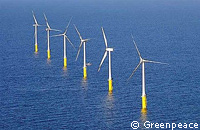Dimas tells industry: invest now to secure eco-innovation lead
During a dedicated session on eco-innovation at this year's European Business Summit, Environment Commissioner Stavros Dimas urged all businesses to invest in green technologies now or risk Europe's current leadership in the sector. With an annual expenditure of 200 billion euro and yearly growth of around 5 per cent, Europe's eco-industries currently account for one third of the global market, he said. However, other countries have seen the potential of this market - Japan is already ahead in hybrid car design and Brazil leads the world in biofuels - and ensuring future European leadership means planning and investing now. 'Ten years ago it would have been inconceivable that an international business summit dedicated an entire section to eco-innovation,' Mr Dimas told his audience. 'In another ten years time I hope that it will be all industries who are looking at eco-technologies. We will take them for granted in much the same way as we now do with information technologies.' Environmental problems are not going to go away, he continued, and as resources become scarcer it is clear that demand for environmental technologies will increase. Mr Dimas outlined some of the initiatives that the EU and its Member States are taking to prepare European industry to meet this future demand, particularly through the 2004 Environmental Technologies Action Plan. First, the action plan encourages green procurement by public authorities, whose annual spending accounts for 16 per cent of EU GDP, which could be used to create mass markets for environmentally friendly goods and services. Through its Competitiveness and Innovation Framework Programme (CIP), the Commission also hopes to mobilise financing for eco-technologies, in particular through risk and venture capital. Finally, EU policymakers are considering new incentives to support eco-products as well as the removal of subsidies that damage the environment. Overall, the Commissioner believes eco-technologies present a win-win solution for European industry, offering business opportunities and a response to the environmental challenges that we all face. Indeed, the only way to achieve sustainable economic growth in future will be to 'decouple' it from negative impacts on the environment. 'I would encourage all businesses to reassess their business plans to see where money can be made from developing environmental technologies and where it can be saved by applying these technologies,' Mr Dimas concluded. After the session, CORDIS News spoke to Dr Wolfgang Sachs, another of the participants and a senior research fellow at the Wuppertal Institute, a German environmental policy research centre. He said that the discussion had been encouraging, with a consensus that eco-efficiency must be a guiding principle for all and broad support for processes that are more compatible with natural flows, such as wind energy and biofuels. He also said that the Commission was 'on the right track' with its approach to eco-technologies. However, Dr Sachs did identify a conflict running through the summit and indeed the wider EU in terms of the balance between the environment and competitiveness. 'The session on eco-innovation was the only one referring to the eco predicament we are in, while the rest of the event talks solely about competitiveness. [The] Lisbon [agenda] is now predominantly discussed in terms of competitiveness too. To act as if the economy is somehow independent of the biosphere is still the norm.' While it is true that the EU will shortly be in a position where further GDP growth can be achieved without resulting in a proportionate increase in pressure on the environment (what Dr Sachs describes as relative decoupling), Europe is still light years away from the drastic reduction in environmental damage (or absolute decoupling) that is really necessary. 'We couldn't discuss all these issues in the panel as it was too short, but this is a discussion that does need to happen,' he said. Dr Sachs feels encouraged by the fact that few people now deny that climate change is happening, and that people are beginning to realise that if the model of consumption created in the West is copied in rapidly developing countries, we will all be in trouble. 'So if we are going to have more growth, then we are going to need a different kind of economy.' However, if the business community thinks that eco-innovations alone can provide the answer, he fears they are missing the point. 'Looking at the rest of the discussions [at the summit], businesses are obsessed with creating a competitive Europe to compete with the US, but this isn't the broader challenge. Innovation can only be a means to an end, but what is that end - for who's benefit and for what are we innovating - this question has been curiously left out in my view.'



